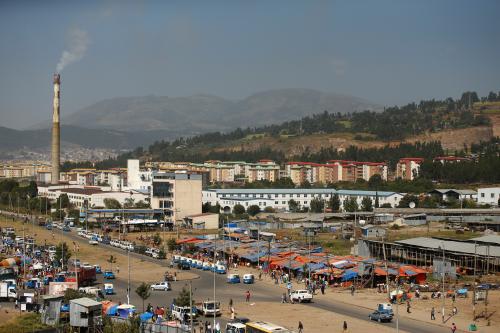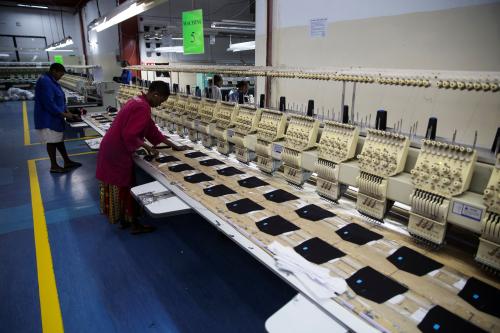This week, from May 22 to 26, the African Development Bank Group (AfDB) is holding its 52nd annual meetings in Ahmedabad, India on the theme of “Transforming Agriculture for Wealth Creation in Africa.” India’s partnership with the AfDB spans over 30 years, and India has notably expanded its economic ties with sub-Saharan Africa recently—although it still lags behind the region’s other major partners such as China, the EU, and the U.S. (See Three trends in Indo-African trade and investment by AGI Nonresident Senior Fellow Amadou Sy for more information on India-Africa economic relations.)
On Monday, the annual meetings opened with the launch of the AfDB’s flagship African Economic Outlook (AEO) report, which it produces jointly with the Organization for Economic Cooperation and Development and the United Nations Development Program on an annual basis. The theme of this year’s AEO is Entrepreneurship and Industrialization, two areas that the report argues must be leveraged in order to create job opportunities for the continent’s growing labor force and accelerate inclusive, economic growth.
According to the report, 22 percent of Africa’s working-age population are starting new businesses, which is the highest rate of any region in the world. Meanwhile small and medium enterprises (SMEs)—those with fewer than 20 employees and less than 5 years’ experience—now constitute the largest providers of formal sector jobs in sub-Saharan Africa. As 29 million youths join the region’s labor force every year between 2015 and 2030, countries will need to hasten the pace of employment creation across the continent. At the same time, African governments are devising and implementing strategies to promote economic transformation through industrialization. The report argues, “Innovative industrialization strategies could better target high-potential entrepreneurial activities to accelerate industrialization.” However, a number of constraints currently stifle entrepreneurship in Africa, for example, limited access to finance, costly and unstable electricity supply, and political instability (see Figure 1). The AEO recommends that African governments pursue policies that facilitate business for entrepreneurs by improving their skills, supporting opportunities for firm clustering, and expanding firms’ access to financing (see Figure 2).
Figure 1: African firms’ most common operating constraints, 2015 or most recent year
 Figure 2: Improving Africa’s entrepreneurship for its industrialization
Figure 2: Improving Africa’s entrepreneurship for its industrialization

The Brookings Institution is committed to quality, independence, and impact.
We are supported by a diverse array of funders. In line with our values and policies, each Brookings publication represents the sole views of its author(s).







Commentary
Figures of the week: Entrepreneurship and industrialization in Africa
May 25, 2017